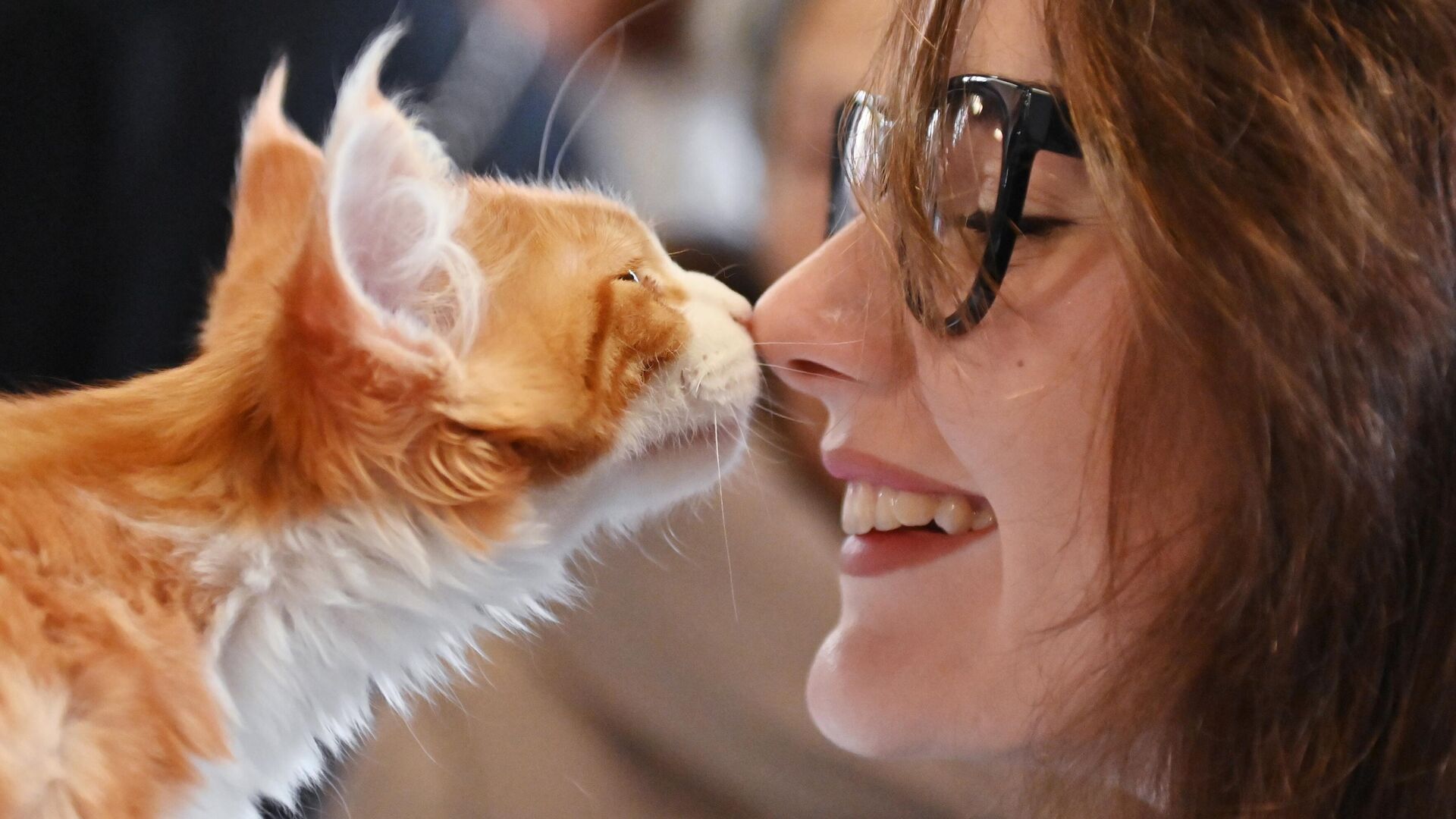https://sputnikglobe.com/20230715/cyprus-cat-population-under-threat-sparking-fear-of-contagion-in-the-uk-1111891191.html
Cyprus Cat Population Under Threat, Sparking Fear of Contagion in the UK
Cyprus Cat Population Under Threat, Sparking Fear of Contagion in the UK
Sputnik International
The increasing contagious spread of a feline disease in Cyprus has raised concerns about the potential transmission of the disease to the UK, given the close... 15.07.2023, Sputnik International
2023-07-15T15:54+0000
2023-07-15T15:54+0000
2023-09-01T13:11+0000
beyond politics
united kingdom (uk)
europe
britain
hit
coronavirus
https://cdn1.img.sputnikglobe.com/img/07e7/05/1a/1110614493_0:32:3528:2017_1920x0_80_0_0_38fce26104d91e02d6916ee1fb40319b.jpg
A deadly outbreak of feline infectious peritonitis (FIP) has claimed the lives of roughly 300,000 domestic and stray cats on the island of Cyprus since January, reports Dinos Ayiomamitis, head of Cat Protection and Welfare Society (PAWS) Cyprus.Britain and Cyprus share a relationship characterized by a rich history of expatriate travel and cats relocation from the island to the UK. This has raised concerns about FIP, what’s behind the high cat mortality rate associated with it, and whether there is a possibility of an outbreak in the UK.FIP is a fatal cat disease caused by a contagious virus called feline coronavirus (FCoV). It is transmitted through feline excreta. While most infected cats have no symptoms or show minor diarrhea, it could transform into FIP, which usually causes death.According to Dr. Jo Lewis, a feline veterinary surgeon and author of What's My Cat Thinking?, the infection rates are highest among cats living in confined spaces which share litter boxes, like catteries and rescue centers. The virus can also be transferred through grooming brushes, cat litter scoops, and human contact. This may suggest why many indoor cats in Cyprus have been affected by feline infectious peritonitis.The head of the International Society of Feline Medicine, Dr. Nathalie Dowgray, expressed deep concern regarding the outbreak in Cyprus, acknowledging the grim reality that treatment may not be possible for many affected cats, including strays. This unfortunate circumstance is expected to result in cat fatalities.A cat’s chances of contracting FIP are conditioned by the "types of mutations, the load of virus and individual cat immune system," Dr. Dowgray said.Symptoms of FIPDiagnosing feline infectious peritonitis is challenging, but most cats infected with the virus exhibit common symptoms like fever, lethargy, and loss of appetite. There are two variations of the virus: wet and dry FIP. Cats with wet FIP experience fluid accumulation in their abdomen or chest, causing swelling. On the other hand, cats with dry FIP have less fluid build-up but may manifest diminished appetite, elevated body temperature, and visual impairment. Cats between 3 months and 2 years are more prone to contract FIP.Why Did FIP Hit Cyprus?The outbreak of FIP in Cyprus can be attributed to the island's reputation as the "island of cats” - a 9,500-year-old burial site revealed the domestication of cats on the island.Feline coronavirus is commonly spread via cat poop. Densely populated cat communities, combined with their proximity to each other, create an environment where the virus spreads easily. Experts have found that FCoV can evolve into FIP.The stress experienced by cats living in crammed shelters increases the likelihood that they will contract FIP.What’s the Scale of the Outbreak?Normally, FIP is reported in just 1% of the cat population. However, during outbreaks like in Cyprus, the incidence of FIP can rise dramatically, with 40-50% of cats falling victim to the disease."What's concerning about the evidence from the Cyprus outbreak is that a particularly nasty FCoV mutation seems to have already occurred," Dr. Lewis noted.Potential Risks to UK CatsDr. Lewis believes that an outbreak of unprecedented magnitude is causing concern among cat owners and veterinarians. If this outbreak reaches the UK, our beloved pets could experience serious consequences. The main risk to cats in Britain is through the import of animals, particularly from Cyprus, where many British expats reside. He suggests screening cats leaving Cyprus and nearby affected countries to minimize the risk. It is important to examine and test the blood of these cats for FCoV antibodies, and any cats showing symptoms should not be allowed to travel.Can FIP infect Humans?No, humans can't contract feline coronavirus, so FIP poses no risk to them.What’s the Cost of Treating FIP?Previously, the disease had limited treatment options, resulting in the euthanasia of most affected cats. Also, there is no FIP vaccine in the UK. In the UK, there are expensive treatment options for FIP, such as Remdesivir injections, also used for humans with COVID-19, and an oral tablet called GS-441524, Dr. Lewis noted.In Cyprus, GS-441524 can be imported from the UK but comes at a high cost, ranging from €3,000 to €7,000 (£2,500 to £6,000) per cat. The use of Molnupiravir, an antiviral pill, as a treatment for FIP has been contemplated, but it has not been authorized for feline use in Cyprus.
united kingdom (uk)
britain
hit
Sputnik International
feedback@sputniknews.com
+74956456601
MIA „Rossiya Segodnya“
2023
Chimauchem Nwosu
https://cdn1.img.sputnikglobe.com/img/07e7/09/01/1113046371_0:99:1536:1635_100x100_80_0_0_9c5c627283eca931c39fe4852bbb301c.jpg
Chimauchem Nwosu
https://cdn1.img.sputnikglobe.com/img/07e7/09/01/1113046371_0:99:1536:1635_100x100_80_0_0_9c5c627283eca931c39fe4852bbb301c.jpg
News
en_EN
Sputnik International
feedback@sputniknews.com
+74956456601
MIA „Rossiya Segodnya“
Sputnik International
feedback@sputniknews.com
+74956456601
MIA „Rossiya Segodnya“
Chimauchem Nwosu
https://cdn1.img.sputnikglobe.com/img/07e7/09/01/1113046371_0:99:1536:1635_100x100_80_0_0_9c5c627283eca931c39fe4852bbb301c.jpg
feline infectious peritonitis, fip, island of cyprus, dinos ayiomamitis, head of cat protection and welfare society, paws, britain, the uk, high cat mortality rate, cat disease, feline coronavirus, fcov, feline excreta, dr. jo lewis, author of what's my cat thinking, international society of feline medicine, dr. nathalie dowgray, cat fatalities, fip in cyprus, fcov mutation, fcov antibodies, fip vaccine, treatment for fip, gs-441524, use of molnupiravir, remdesivir injections
feline infectious peritonitis, fip, island of cyprus, dinos ayiomamitis, head of cat protection and welfare society, paws, britain, the uk, high cat mortality rate, cat disease, feline coronavirus, fcov, feline excreta, dr. jo lewis, author of what's my cat thinking, international society of feline medicine, dr. nathalie dowgray, cat fatalities, fip in cyprus, fcov mutation, fcov antibodies, fip vaccine, treatment for fip, gs-441524, use of molnupiravir, remdesivir injections
Cyprus Cat Population Under Threat, Sparking Fear of Contagion in the UK
15:54 GMT 15.07.2023 (Updated: 13:11 GMT 01.09.2023) The increasing contagious spread of a feline disease in Cyprus has raised concerns about the potential transmission of the disease to the UK, given the close ties with Cyprus and the relocation of cats.
A deadly outbreak of feline infectious peritonitis (FIP) has claimed the lives of roughly 300,000 domestic and stray cats on the island of Cyprus since January, reports Dinos Ayiomamitis, head of Cat Protection and Welfare Society (PAWS) Cyprus.
Britain and Cyprus share a relationship characterized by a rich history of expatriate travel and cats relocation from the island to the UK. This has raised concerns about FIP, what’s behind the high cat mortality rate associated with it, and whether there is a possibility of an outbreak in the UK.
FIP is a fatal cat disease caused by a contagious virus called feline coronavirus (FCoV). It is transmitted through feline excreta. While most infected cats have no symptoms or show minor diarrhea, it could transform into FIP, which usually causes death.
According to Dr. Jo Lewis, a feline veterinary surgeon and author of What's My Cat Thinking?, the infection rates are highest among cats living in confined spaces which share litter boxes, like catteries and rescue centers. The virus can also be transferred through grooming brushes, cat litter scoops, and human contact. This may suggest why many indoor cats in Cyprus have been affected by feline infectious peritonitis.
The head of the International Society of Feline Medicine, Dr. Nathalie Dowgray, expressed deep concern regarding the outbreak in Cyprus, acknowledging the grim reality that treatment may not be possible for many affected cats, including strays. This unfortunate circumstance is expected to result in cat fatalities.
A cat’s chances of contracting FIP are conditioned by the "types of mutations, the load of virus and individual cat immune system," Dr. Dowgray said.
Diagnosing feline infectious peritonitis is challenging, but most cats infected with the virus exhibit common symptoms like fever, lethargy, and loss of appetite. There are two variations of the virus: wet and dry FIP. Cats with wet FIP experience fluid accumulation in their abdomen or chest, causing swelling. On the other hand, cats with dry FIP have less fluid build-up but may manifest diminished appetite, elevated body temperature, and visual impairment. Cats between 3 months and 2 years are more prone to contract FIP.
The outbreak of FIP in Cyprus can be attributed to the island's reputation as the "island of cats” - a 9,500-year-old burial site revealed the domestication of cats on the island.
Feline coronavirus is commonly spread via cat poop. Densely populated cat communities, combined with their proximity to each other, create an environment where the virus spreads easily. Experts have found that FCoV can evolve into FIP.
The stress experienced by cats living in crammed shelters increases the likelihood that they will contract FIP.
What’s the Scale of the Outbreak?
Normally, FIP is reported in just 1% of the cat population. However, during outbreaks like in Cyprus, the incidence of FIP can rise dramatically, with 40-50% of cats falling victim to the disease.
"What's concerning about the evidence from the Cyprus outbreak is that a particularly nasty FCoV mutation seems to have already occurred," Dr. Lewis noted.
Potential Risks to UK Cats
Dr. Lewis believes that an outbreak of unprecedented magnitude is causing concern among cat owners and veterinarians. If this outbreak reaches the UK, our beloved pets could experience serious consequences. The main risk to cats in Britain is through the import of animals, particularly from Cyprus, where many British expats reside. He suggests screening cats leaving Cyprus and nearby affected countries to minimize the risk. It is important to examine and test the blood of these cats for FCoV antibodies, and any cats showing symptoms should not be allowed to travel.
No, humans can't contract feline coronavirus, so FIP poses no risk to them.
What’s the Cost of Treating FIP?
Previously, the disease had limited treatment options, resulting in the euthanasia of most affected cats. Also, there is no FIP vaccine in the UK. In the UK, there are expensive treatment options for FIP, such as Remdesivir injections, also used for humans with COVID-19, and an oral tablet called GS-441524, Dr. Lewis noted.
In Cyprus, GS-441524 can be imported from the UK but comes at a high cost, ranging from €3,000 to €7,000 (£2,500 to £6,000) per cat. The use of Molnupiravir, an antiviral pill, as a treatment for FIP has been contemplated, but it has not been authorized for feline use in Cyprus.



